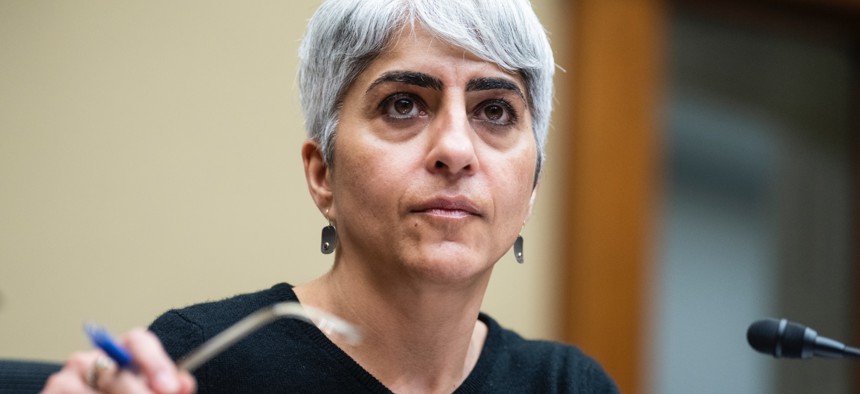
OPM Director Kiran Ahuja wants federal supervisors to “maximize the effective use” of probationary periods for supporting talent and identifying poor performers. Tom Williams / Getty Images
OPM encourages federal supervisors to make better use of probationary periods
The federal government’s HR agency urged agency managers to remove poor performers before most removal protections kick in, as well work more closely with new employees early in their tenure to help them succeed.
The Office of Personnel Management on Wednesday urged supervisors at federal agencies to take a more active role in managing the performance of new federal employees, including removing those who perform poorly and improving engagement to ensure they have the tools to succeed.
When someone is first hired into the federal government, their first year is called a probationary period. During the probationary period, employees lack many of the removal protections enjoyed by tenured federal workers.
In a memo to agency heads Wednesday, OPM Director Kiran Ahuja encouraged federal supervisors to “maximize the effective use” of probationary periods, both by weeding out poor performers before they earn full Title 5 due process rights and by engaging in closer supervision of new employees to help them learn how to successfully do their jobs.
Ahuja argued that agencies need to do a better job of ensuring supervisors know when their subordinates are approaching the end of their probationary period so that they can actively decide whether to continue employing those new workers.
“OPM advises agencies to periodically remind supervisors and managers about the value of the probationary period, particularly as they hire new talent,” she wrote. “This notice to supervisors could occur four months prior to expiration of the probationary period, and then again one month prior . . . or any other time intervals the agency determines appropriate. When doing so, agencies should also advise a supervisor to make an affirmative decision regarding the probationer’s fitness for continued employment or otherwise take appropriate action.”
That refrain has been common among HR policy circles for years when discussing the federal government’s perceived inability to deal with poor performers. The Trump administration offered similar advice, albeit in conjunction with proposals to expand the probationary period to two years—akin to the then-policy at the Defense Department, which phased out earlier this year.
But in contrast with the previous administration, Ahuja also urged supervisors to take a more active role in helping new employees learn how to succeed in their roles.
“If your employees don’t understand what is expected, it will be very hard, if not impossible, for them to meet those expectations,” she wrote. “Providing clear expectations doesn’t necessarily require you to lay out precisely written, detailed instructions on conduct or every performance component. Generally, the question you should ask yourself is: ‘Would a reasonable person understand what was expected?”
She also stressed the importance of providing constructive—and frequent—feedback, particularly early in a federal employee’s tenure.
“Feedback, both positive and corrective, whether given in regularly scheduled meetings or in unscheduled discussions, is crucial to ensuring that expectations are understood,” Ahuja wrote. “Probationers should receive closer supervision and instruction, as needed during the first year of their employment. Managers and supervisors are advised to view this provided time period as an opportunity to potentially course correct with capable employees. These measures aid in preserving the investment the agency has made in the probationer.”







